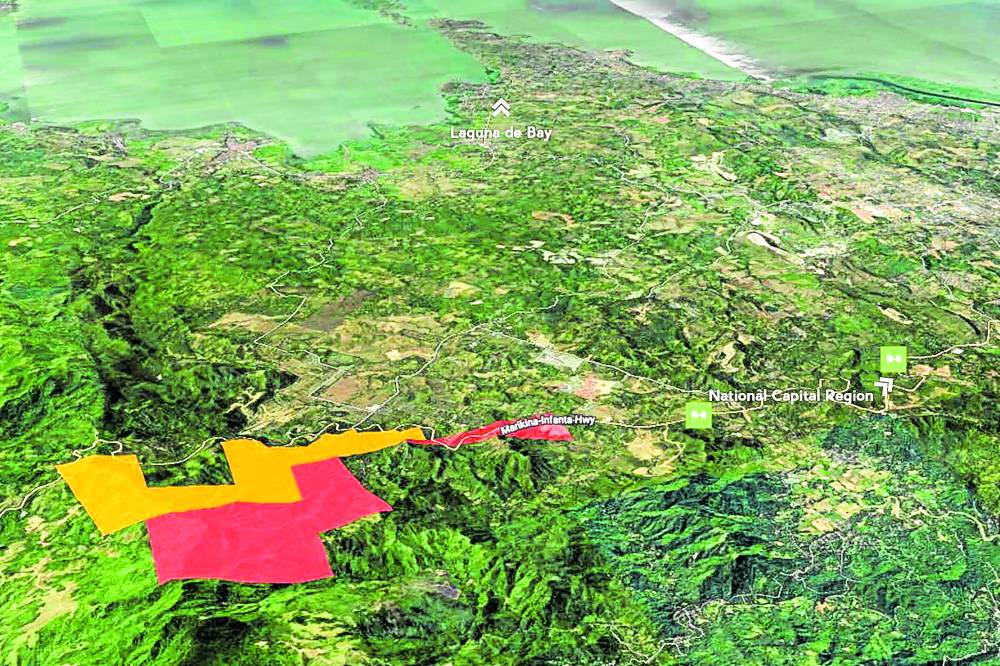Watershed defenders win vs quarrying

SPARED EARTH A map shows the areas covered by the mineral production sharing agreements previously granted to the Quarry Rock Group Inc. (in red) and Rapid City Realty and Development Corp. (orange). The Department of Environment and Natural Resources has revoked their quarrying permits which covered a total of 1,343 hectares within the Upper Marikina River Basin Protected Landscape and Masungi Geopark Project. —PHOTO COURTESY OF UPPER MARIKINA WATERSHED COALITION
A coalition of environmental groups claimed a “major victory” as the Department of Environment and Natural Resources (DENR) ordered the cancellation of the quarrying permits of three companies within the Upper Marikina River Basin Protected Landscape (UMRBPL) and Masungi Geopark Project.
After three years of “tireless campaigning,” the Upper Marikina Watershed Coalition (UMWC) on Thursday confirmed that the three mineral production sharing agreements (MPSAs) had been canceled by the DENR after it received copies of the orders.
Under an MPSA, the government allows a contractor to mine in a contract area.
In separate department orders dated Dec. 19, 2022, and signed by Environment Undersecretary Juan Miguel Cuna, the DENR canceled the MPSAs granted to Rapid City Realty and Development Corp., Quimson Limestone Inc. (QLI) and Quarry Rock Group Inc.
The quarrying permits of the three companies covered 1,343 hectares of the Masungi protected area.
Article continues after this advertisement“Despite this major victory, the fight to protect the Upper Marikina Watershed and the Masungi Geopark Project continues,” UMWC said in a statement.
Article continues after this advertisementIt said that quarrying, “harmful” resorts and land grabbing continued in other parts of the protected areas while harassment against environment defenders and incursions into reforestation sites were increasing.
Rapid City, which covers a contract area in the municipalities of Baras and Tanay in Rizal province, was cited for its failure to renew its five-year exploration period for over 22 years and to submit corresponding work programs required by the MPSA.
Rapid City’s over two decades of negligence in mining its 400-hectare contract area “deprived the government of revenues and the local community with employment and social development projects.”
Based on DENR Administrative Order No. 2010-21, or the Revised Implementing Rules and Regulations of the Philippine Mining Act of 1995, permit holders must pay the required quarry fees to the concerned provincial or city treasurer.
A mining company is also required to pay the excise tax on mineral products as provided in the National Internal Revenue Code of the Philippines through the Bureau of Internal Revenue.
According to the Local Government Code, local governments are entitled to a 40-percent share of the gross earnings from mining taxes, royalties from mineral reservations, forestry charges, and fees and revenues.
DENR records also showed that QLI did not submit and secure the approval of a three-year development and utilization work program, environmental protection and enhancement program, and final mine rehabilitation and decommissioning plan.
The company was cited for failing to establish a final mine rehabilitation or decommissioning fund, and to conduct quarrying operations since its MPSA was approved in 1999.
The company said that it continued paying more than P2 million annually for the care and maintenance of its contract area.
On April 28, 2021, the regional office of the Mines and Geosciences Bureau (MGB) in Calabarzon (Cavite, Laguna, Batangas, Rizal, Quezon) sent a show cause letter to QLI requiring the company to explain why its permit should not be canceled.
The company responded on May 4, 2021, saying, among other things, that the management considered not renewing the contract after March 2019 when then Environment Secretary Roy Cimatu declared that all the areas covered by the MPSAs were part of Masungi Georeserve, a protected area.
Quarry Rock failed to conduct mining operations under its MPSA since 2003, and to submit and secure approval of the required three-year development or utilization work program, environmental protection and enhancement program, and a final mine rehabilitation or decommissioning plan.
Like QLI, it also failed to establish a final mine rehabilitation or decommissioning fund.
Quarry Rock, which started operations in 1998, wrote MGB Calabarzon on May 17, 2021, saying that it voluntarily stopped its activities following “endless complaints” from civil society organizations and a priest identified as Fr. Efren Jimenez.
“This is a significant step toward the preservation and protection of the ecological services and natural resources of the Upper Marikina River Basin Protected Landscape,” UMWC said in its statement.
The group said that it was looking forward to seeing these cancellations “enforced and take effect on the ground.”
Established through Presidential Proclamation No. 296 in 2011, the UMRBPL has a total land area of 26,126 hectares that include parts of Antipolo City and the municipalities of Baras, Rodriguez, San Mateo and Tanay, all in Rizal.
Together with the Kaliwa Watershed Forest Reserve, UMRBPL is instrumental in “regulating the flow of water” toward Metro Manila.
According to UMWC, aside from being home to a diverse population of flora and fauna, UMRBPL is also the ancestral land of the indigenous Dumagat-Remontado indigenous cultural community.
“The cancellation of the quarrying agreements will help ensure not just their safety but the preservation of their cultural heritage and sacred mountain for years to come,” the coalition said.
Members of UMWC include Kalikasan-People’s Network for the Environment, Alyansa Tigil Mina, Non-Timber Forest Products – Exchange Programme, Youth Advocates for Climate Action-Philippines, Youth Strike for Climate Philippines, World Economic Forum Global Shapers Manila Hub and Masungi Georeserve Foundation.